This is my entry in CineMaven's Essays From the Couch For the Umpteenth Blogathon. You know, movies you've seen so many times every word, look and outcome is carved in your heart? Click HERE for more cinematic obsessions by people like us... you know, movie nuts.
The Roaring Twenties (1939)
There are people who study the cinema, and rave about the art of film, but me - I love the movies - pure and simple. Frankly, I'm a little sketchy on directors, writers, cinematographers and the like. I guess I prefer to believe that it all comes together by magic. It's always the actors and the characters they play that hook me. I know they are crucial ingredients in the final recipe, but great writing, great scoring, all that great behind the screen stuff - for me it all serves the personalities I'm involved with. And I say involved because, yes, I'm one of those people who can watch the same movie over and over again until I actually feel as though I am an invisible participant - the voice who encourages, agrees, swoons, warns and despairs. See, I'm an absorber, not an observer. Don't expect me to talk about great visual shots, director intentions and the like. I'm not one of those people. I do not stand apart as a cool observer. I see them, but the movie, if I love it, is absorbed as a whole into my mind and heart. And a really special movie is one I can watch again and again. Nothing changes, except maybe me. The emotions I write over the story might change as I change over the years, but the story remains reliably the same. I know, I'm nuts.
It might also be a character flaw of mine that I am always sympathetic to James Cagney, no matter how corrupt the character he is playing. Hey, I even root for Cody Jarrett ("White Heat"), but that's another story. His personal charm makes me overlook the last 10 guys he might have plugged, but it's always for a good reason, isn't it? His unique and particular sense of honor and morality is unbreakable. I'd have made a great gun moll. Anyway, there is less of a conflict for me (legal-wise) in "The Roaring Twenties," Cagney's last gangster role until the aforementioned Cody Jarrett a decade and a world away.
The Story
 |
| Eddie Bartlett at the top of his game |
"The Roaring Twenties" is based on writer and gad about producer Mark Hellinger's memory story of that fabled era, with fictional characters based on real-life people he may or may not have rubbed elbows with (he seemed to be a bit of a fabulist, but what the heck, he was a writer).
By 1939, enough time had passed for some cultural reflection on the aftermath of World War I, a crime wave caused by prohibition, and the stock market crash of 1929. 1939 also saw the world on the brink of another war. The story opens with a warning of things to come (Mussolini and Hitler are featured prominently) and a nostalgic look backwards to World War I, the war that was supposed to make the world safe for democracy. It is there that we meet our everyman, Eddie Bartlett (Cagney) and the two "friends" who have a dramatic impact on his life; George Hally (Humphrey Bogart) and Lloyd Hart (Jeffrey Lynn). They form a bond of sorts in the trenches of France and their characters are quickly defined: Eddie is a tough but decent guy who just wants to get along and go back to his job in a garage, Lloyd is a classy guy, a lawyer who dreams of an office in the Chrysler Building and George, well, George really likes that machine gun and thinks it might do him some good back home. Some of Eddie's boredom and loneliness at the front is soothed by his regular letters from a very nifty looking gal who lives in Mineola, Long Island.
 |
| Three in a trench |
Documentary style, we see that when Johnny came marching home again after the war, soldiers are met with parades and little else. The Jazz age beckoned, women's skirts are being raised and their hair bobbed. The biggest change comes with the passage of the Volstead Act and the proliferation of bootleg booze and gangland crime as the response to "an unpopular law and an unwilling public." Eddie lands back at home with his loyal cabbie buddy Danny (played by everybody's best pal, Frank McHugh), but is unable to find a job no matter how hard he tries.
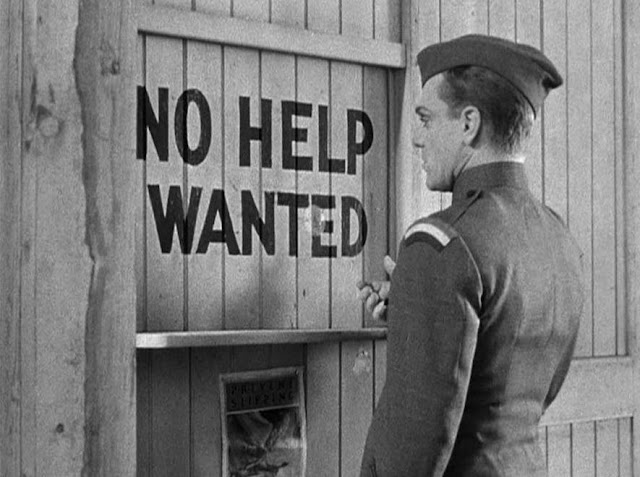 |
| So much for the thanks of a grateful nation. You can't live on a parade. |
A respite from the disappointment comes when Eddie and Danny drive out to Mineola to meet this hot pen pal dish of Eddie's. Unfortunately for Eddie, Jean, the girl of his dreams (Priscilla Lane), is really a high school student who sent him a dolled up photo from a school play. Another disappointment for Eddie, who tells her he will look her up in a few years.
 |
| Jean is not quite the sexy dame she claimed to be. Eddie should have known then and there she was a little liar. |
To make a living, Eddie shares cab driving duties with Danny and it is then that he innocently brings some bootleg booze into a speakeasy and we are introduced to the unforgettable club hostess Panama Smith (Gladys George). Eddie is nabbed by the cops for violating the Volstead Act and reluctantly takes the rap for Panama, who proves to be an all right dame when she bails him out and introduces Eddie to the world of bootleg booze and fast, easy money. Eddie likes her as a friend, but it's clear Panama has fallen for our hero hook, line and sinker.
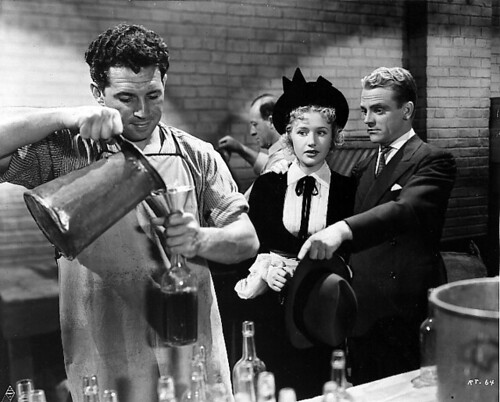 |
| Eddie shows Jean around the office. |
Fast forward to Eddie's criminal rise in the booze business. He's a hard worker! Lloyd was the mouthpiece who initially couldn't keep Eddie out of jail, but Eddie, ever loyal to his friends, keeps Lloyd on as his lawyer. He mainly has him purchasing taxi cabs as as a cushion against hard times. Lloyd does not like Eddie's criminal enterprise, but he sticks around anyway with a perpetual disapproving puss. Oh, and he pockets the money.
Eddie once again connects with his Mineola gal, who is now dancing and singing in the chorus of a show. Since she is no longer a school girl and has filled out rather nicely, Eddie takes his shot and he and Jean become an item. He is so smitten with her that he strong arms Panama and the club owner into giving her a singing job. Meanwhile, Eddie has also hooked up with the dangerous George and together they move into the big time rackets.
You know the rest, right? Jean and Lloyd fall in love. Everyone can see it coming like a freight train except Eddie. Ever the realist, George even tries to warn Eddie that Lloyd is moving in on his girl, and Panama agrees, but Eddie refuses to consider such traitorous behavior from his friend and sweetheart. "I trust my friends" he fatally growls and walks away. George tells Panama that is a big mistake. "I don't trust mine," he says, to which she replies "they don't trust you either," and the two clear-eyed people who really know the score share a knowing smile. His is lethal, hers is full of resignation.
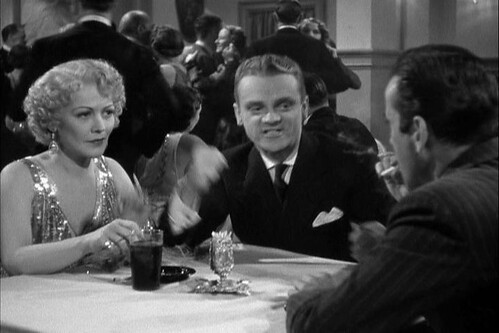 |
| "I trust my friends." Eddie's big mistake |
Meanwhile, poor Danny is murdered by a rival gang, George double crosses Eddie, the stock market crashes, and Prohibition is repealed. George, ever resourceful like a sewer rat, comes out fine and, when Eddie offers to sell his fleet of cabs to George for some much needed cash, George leaves him with one cab," 'cause you're gonna need it."
 |
| Jean asks Eddie how he is. He's back to driving a cab. How the hell does she think he is? |
George was right. After the illegal booze business dries up, Eddie is back driving a cab. And who does he pick up for a fare one day? Why, Jean in a mink coat laden down with Christmas gifts. She even invites Eddie into her lovely home with her adorable little boy, when Lloyd comes home and wants Eddie to stick around and talk about old times. What fun! Jean and Lloyd - what a pair. These two knuckleheads deserve each other. Eddie declines because how much humiliation and heartbreak can a guy take, but generously warns Lloyd, who is now with the District Attorney's office, that George is a danger to him because he knows too much.
So it comes to pass that George's henchmen warn Jean that if Lloyd talks he will die. What else would a clueless little self centered bitch do? Why of course, go back to Eddie, who is now drowning his sorrows in legal booze while Panama sort of sings at some dinghy dive, and ask for his help. Ah, but he still has a thing for her and so, unshaven and so down on his luck that, as one fancy thug says, "the rags of his pants are beatin' him to death", he goes to George to ask him to lay off Lloyd. Well, George is nothing if not consistent. Naturally he declines and figures he needs to get rid of Eddie, too. Happy New Year.
But, Eddie still has some fight in him, and he manages to plug George (and a few others) and escape, only to be gunned down on the street by George's goons.
The rest is poetry. Eddie, shot in the back, staggers down a city block until he comes to the steps of a church. He manages, blindly, to climb a few steps only to finally surrender to death. Panama races to him as he takes a balletic fall to the street, but it is too late. She cradles his lifeless body in her arms and when a passing cop (man, those cops are always too late) asks her who he was and what was his business, she utters those unforgettable closing words (backed by "Melancholy Baby"), "he used to be a big shot." Chills.
 |
| In a world where good people go wrong, Panama and Eddie strike a post-prohibition Pieta pose for their final curtain. |
The Things I Want to Say
As I said, I find myself as a tragically unheard voice in this story. Here's a few things I need to get off my chest.
First: Eddie - do not bring that bottle of bootleg booze into Panama's club. If you don't go there, you might remain happy driving a cab until something better comes along. Of course there would be no story if this happened, but play with me here.
Second: Eddie - DO NOT FALL FOR JEAN. SHE IS A LITTLE CHEAT AND IS TOXIC FOR YOU. Plus, her singing is high school level at best. If you grow up to be Marty Snyder in "Love Me or Leave Me," at least you'll find a better singer in Ruth Etting to obsess over.
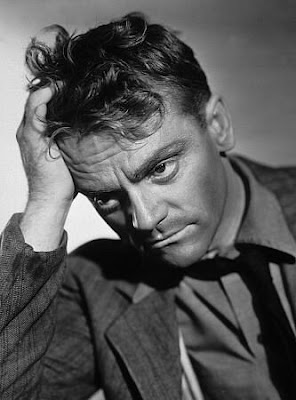 |
| What the hell is this dumb dame talking about? Who are Marty Snyder and Ruth Etting? |
Third: Eddie - It's okay to trust your friends. Danny and Panama are your friends and, trust me, you can trust them. But, and listen carefully to me Eddie; JEAN, LLOYD AND GEORGE ARE NOT YOUR FRIENDS. Therefore, do not trust them. Got it?
Fourth: Eddie - Look, Panama is really in love with you. You could do worse. Stick with her. And while you're at it, stop drinking. When Jean tracks you down and begs for your help telling you that it's Lloyd's duty to go after George - man, please let there be a half a grapefruit on that table just made for her sanctimonious little kisser. She sees you're boozed up and a mess and doesn't even ask how you are.
Fifth*: This one is for, you, Panama. Girl - look harder - Eddie is not dead! When you tell the cop he's dead - you need to take another look. He is clearly breathing. Get our lad to the hospital quickly!
*Number five is an indication I have seen this movie umpteen times. Take another look at the clip above and you'll see it.
The Characters/Actors
 |
| The best thing about Jean's act are the smoking chorus girls behind her. |
Let's start with Jean, played by Priscilla Lane. I hate her. She is a user and a cheat. The first time she meets Lloyd she practically drools. A little minx in a good girl wrapper. Priscilla Lane is pretty, but she just isn't in the same league as the other principles. Her best moments are as the innocent schoolgirl. In no way can I believe that she is hot enough for speakeasy patrons, let alone Eddie. Plus, her singing stinks. When Eddie, who always foots the bill, asks her how her singing lessons are coming, Jean tells him not to waste his money. Those are the truest words she speaks in this movie.
 |
| When Wonder Bread meets bologna: The first meeting between Jean and Lloyd. Look at those goo-goo eyes she gives him. |
Lloyd, played by that big slice of white bread Jeffrey Lynn, made for an equally annoying and ultimately boring character. Another self-righteous guy who steals his friend's girl. Eddie calls him big, dumb and good looking. He might have added untrustworthy weasel.
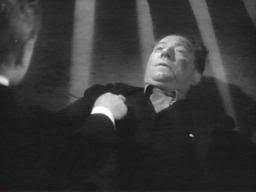 |
| Poor Danny. He just wasn't cut out for this racket. |
Danny, played by Frank McHugh, is terrific as always. He's like Lassie - a guy's best pal. When he is murdered by Eddie's gangland rival, a little bit of the heart goes out of Eddie, and it's the beginning of the end.
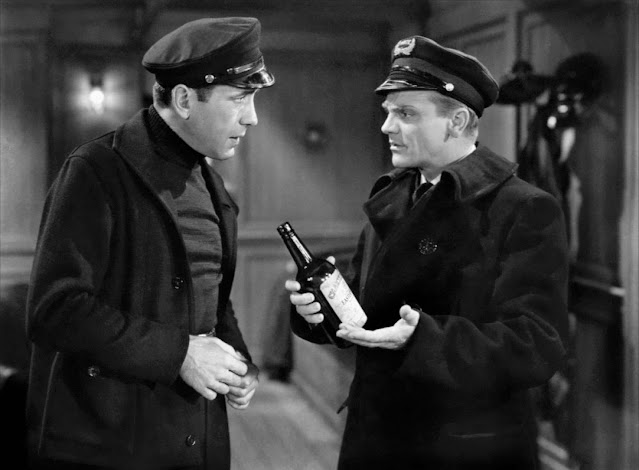 |
| George introduces Eddie to the big time - and murder. |
George is one nasty, heartless S.O.B. and I mean that in the most complimentary way. Humphrey Bogart, waiting for superstardom, is unrelentingly snarky, sneering, nasty and pretty darn wonderful here. Sure he's shifty and cowardly, but you always know where George is coming from. In a topsy turvey world of uncertainty, you can always count on George to be George.
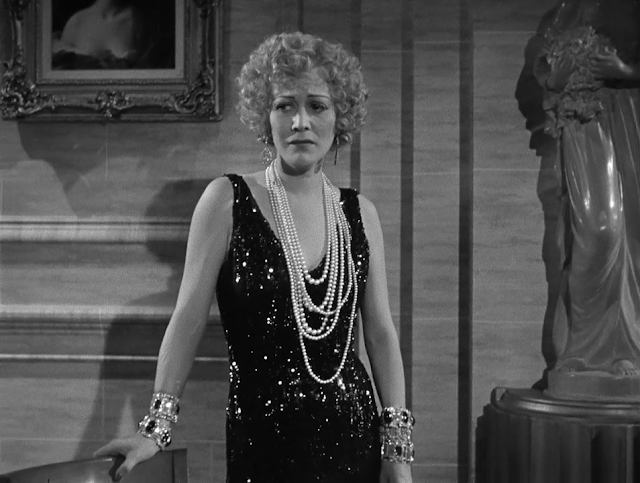 |
| Everything Panama is is written on her face |
Panama, as played by Gladys George, is simply perfect. Her total devotion to Eddie, even when he is so clearly besotted with Jean, is heartbreaking. She plays the speakeasy hostess with panache and humor, but her hurt is always there. More than once Eddie tells her to "shaddup," and she never gets sore, just takes it because she loves him yet knows it is useless to try and stop him from self destruction. When she tells him that they both have finished out of the money in the race to the top, you know this is a woman who sticks with her man through thick and thin. It's to Eddie's credit that he is still with her at the end. In an unforgettable performance, Gladys George, with her whisky-soaked voice and brassy manner, steals every scene she is in. In typical Warner Brothers fashion, Glenda Farrell, Ann Sheridan and Lee Patrick were considered for the role of Panama (based, in part on the legendary Texas Guinan), but it's hard to imagine anyone else coming close to Gladys George's beautiful portrait of a tragic all-around good dame with a heart of gold. And no nod for a Best Supporting Oscar.
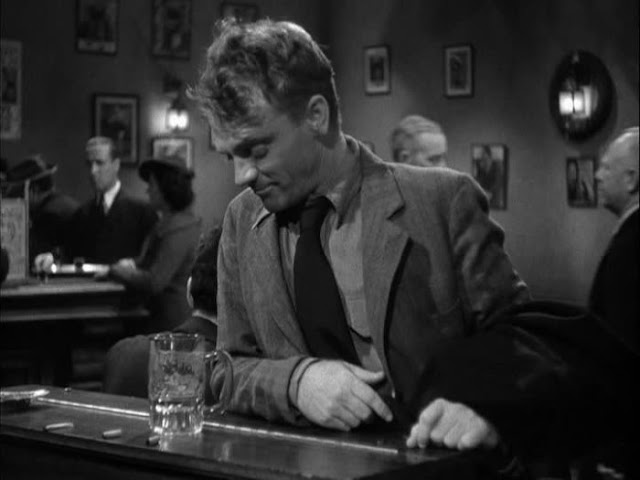 |
| "Melancholy Baby" - Eddie knows he's a sucker and is walking into danger, but he's a guy that has to do the right thing. |
Finally, there is Eddie, as played by James Cagney. Like I said, I'm always rooting for Jim, but this time there is a little more decency, a little more pathos and a lot of bad breaks for his gangster. Like Tom Powers ("The Public Enemy") and Rocky Sullivan ("Angels with Dirty Faces"), Eddie's path to a life of crime was sparked by an outside societal force. But, in this case, it wasn't poverty. It was a country that did not honor its wartime heroes once they returned home, and that really stings. Those of us who lived through Vietnam witnessed similar treatment, and recognize it even today. Cagney always swings for the fences, and his Eddie glitters like a blinding jewel that keeps each portion of the story in motion. While willing to murder if the situation calls for it (rival Nick Brown gets it in the back through a closed door, but he deserved it because he killed Danny), he retains a basic goodness and touching naiveté. He's even polite enough to apologize for socking Lloyd in the jaw after he discovers that he and Jean have been seeing one another on the sly. Everything about what Eddie has done and felt and what he is going to do is indicated in his face and mannerism when he momentarily stops at the piano when "Melancholy Baby" is played before his final confrontation with George. And that last scene...not even Fred Astaire could have managed such a graceful and tragic exit. Nobody died quite like James Cagney. 1939 was a tough year for honors, but it is an award worthy performance.
Final Thoughts: So What is it About this Movie?
I don't know...I think besides the amazing acting and cast of characters, it's the time period and the quasi newsreel quality of the story I like. Told as a memory, it offers a terrifying yet romantic rose-colored view of a recent past, and I'm nothing if not a true romantic. I always want to believe that Eddie will make it out alive and that he and Panama will once again prosper in spite of the odds against them because they got a raw deal and are the good guys in this saga. That's what makes this an umpteenth movie for me: knowing the outcome but hoping for something different each and every time because those guys deserve it and I love them.
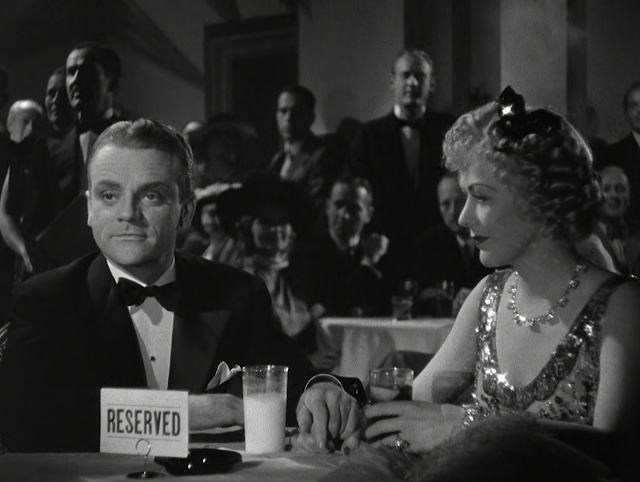 |
| Maybe this time Eddie will see that Panama's better for him? |
If you made it to the end here, you, too, must be part of the repeat offender tribe. Join the rest of us by clicking here. And many thanks to Theresa for hosting this event and giving me a chance to gush about a movie I adore. Again.
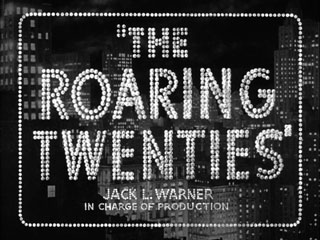
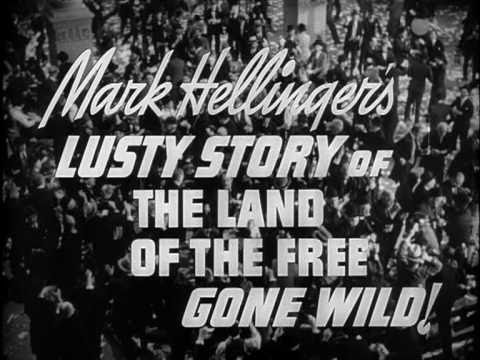
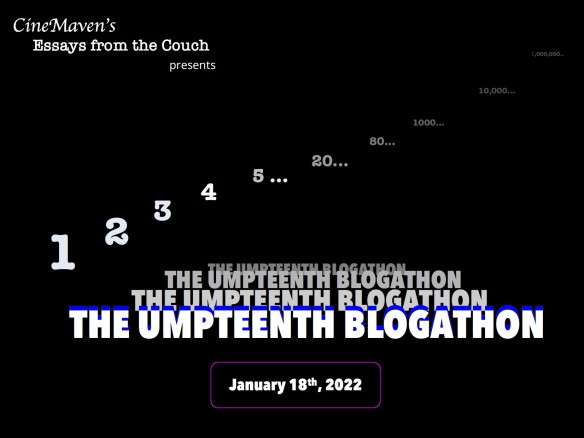
12 comments:
A beautifully emotional review, Marsha, really enjoyed it.
My first viewing of Roaring Twenties was in the early ‘70s, at the USA Film Festival in Dallas. They were honoring Raoul Walsh, whom I had never heard of (I was a baby movie geek then, now an old movie geek), and his eye patch and gravelly voice and amazing stories totally captivated me.
Loved the movie but all I remembered really from that first time is that unforgettable last sequence, Eddie staggering gracefully somehow up those church steps...and Panama’s final line. Can still almost get teary just thinking of it.
Every time I see this movie I am impressed.
Oh, and re Jean: Why don’t you tell us how you really feel? (Kidding...)
I never noticed the chorus girls smoking in that one scene. Good going. A great review of a great film, too. :-)
misospecial - thank you for that lovely comment - beautifully emotional is exactly what I was going for. As for Jean, believe it or not, I went easy on her.
Thank you, Rebecca. It might not be in the number that is in the picture, but it's in one of them - girls dancing with lit cigarette holders.
When I was a kid it seemed as if The Roaring Twenties was on TV every week, and my sisters and I would let it break our hearts every single time. You took me through all those emotions in your article. I have Melancholy Baby echoing in my head, and a sudden craving for a spaghetti dinner (uninterrupted by gunfire).
Hey CW - that Nick Brown sure liked his grated cheese, didn't he? Seriously, thanks, as always, for stopping by and sharing a few precious memories.
Hi there FlickChick! :-) Thanks for the contribution. I haven't read it yet. I'm printing everyone's posts so I can calmly read 'em without ruining my eyes over a blaring computer screen.
One of your readers writes: "A beautifully emotional review, Marsha, really enjoyed it."
Oh boy I'm scared now. It's a killer of a movie and now you're writing's gonna make me verklempt? Ack! Let me hang on to my tear ducts. Plus I hear Priscilla Lane is going to get a going over from you. Well, let me be a big girl and get started reading.
I think I unknowingly hit on something when I made this a topic for my blogathon. How emotionally deep these movies are to us that we give them repeated viewings. Thank you for sharing! I appreciate it.
"...played by that big slice of white bread Jeffrey Lynn..."
Lireerally shot coffee out my nose at that line.
Theresa - aka Cinemaven - many thanks for hosting and for the inspiration. Sorry if I was tough on Priscilla, but she - as Jean - had it coming.
J-Dub - yikes - well he really was, wasn't he? The bore, the brute and the big shot.
I love the way you write about film, and it must be because you embrace the magic and don't worry about deconstructing it. Your sense of wonder is infectious.
The Roaring Twenties is a terrific choice, and I can see why a person would return to it time and again. I loved the "slice of white bread" observation. You've given me a new appreciation for this film, and that's saying something.
Thank you for such a kind comment, Ruth. I'm just not that detail oriented!
Post a Comment